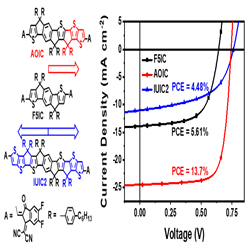Peking University, Dec. 3, 2019: Zhan Xiaowei’s group, from College of Engineering at Peking University, made new progress in nonfullerene acceptors for organic solar cells (OSCs), and developed new molecular design strategy of fused-ring electron acceptors (FREAs), namely unidirectional extension (J. Am. Chem. Soc., DOI: 10.1021.jacs.9b08988).
Since 2006, the Zhan group has been working on nonfullerene acceptors. In 2015, they pioneered the concept of FREAs and invented the landmark molecule ITIC (Adv. Mater., 2015, 27, 1170–1174, cited ca. 1400 times).
Very recently, Zhan’s group proposed a novel molecular design strategy of FREAs-unidirectional extension. Unidirectional extension is the extension of a smaller fused-ring system into a larger fused-ring system in only one direction. The unidirectional extension increases the conjugation length in a smaller step-wise manner relative to the bidirectional extension, allowing a fine tuning of the electronic properties of the molecules. They designed and synthesized a novel fused-8-ring-based FREA, AOIC, by unidirectional extension, and its counterpart, fused-11-ring-based IUIC2, by bidirectional extension, and compared with the parent fused-5-ring-based F5IC. The AOIC-based OSCs show an efficiency of 13.7%, much better than that of F5IC-based cells (5.61%) and IUIC2-based cells (4.48%). This unidirectional extension strategy may open up avenues to other organic functional materials with wide applicability.
The research work was supported by the National Nature Science Foundation of China and Basic Research Promotion Project of Peking University.

The unidirectional and bidirectional extensions, molecular structures and device performance
Edited by: Huang Weijian
Link: https://pubs.acs.org/doi/10.1021/jacs.9b08988